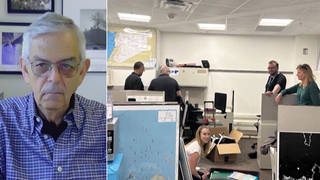
Topics
Guests
- Mehdi Hasanaward-winning British journalist and broadcaster at Al Jazeera English and columnist for The Intercept. He is host of the Al Jazeera interview program UpFront. His new podcast for The Intercept, Deconstructed, will go live Friday. Hasan’s most recent article for The Intercept is headlined “The CBS Interview with Saudi Arabia’s Mohammed bin Salman Was a Crime Against Journalism.”
- Medea Benjaminco-founder of CodePink and author of the book Kingdom of the Unjust: Behind the U.S.-Saudi Connection. Her forthcoming book is titled Inside Iran: The Real History and Politics of the Islamic Republic of Iran. Her latest article for Common Dreams is headlined “Don’t Believe the Media Hype About Saudi Prince Mohammed bin Salman.”
Journalist Mehdi Hasan and Medea Benjamin, co-founder of CodePink, discuss how the United States is siding with Saudi Arabia in its feud with Iran and what it means for the Middle East. Could it mean war against Iran? On Monday, Saudi Arabia called the 2015 nuclear deal between Iran and world powers a “flawed agreement.” President Trump has long threatened to pull out of the deal.
More from this Interview
- Part 1: Reformer or War Criminal? Saudi Crown Prince Welcomed in U.S. as Trump Touts Weapons Deals
- Part 2: As Yemen Faces World’s Worst Humanitarian Crisis, Senate Refuses to End U.S. Support for Saudi War
- Part 3: Are Israel & Saudi Arabia Pressuring U.S. Toward War with Iran?
- Part 4: 15 Years After Invasion of Iraq, Amnesia & Distortion Obscure U.S. Record of War Crimes & Torture
Transcript
AMY GOODMAN: This is Democracy Now! I’m Amy Goodman, with Nermeen Shaikh, as we talk about the visit of the crown prince of Saudi Arabia, a dear friend of Jared Kushner, senior adviser to President Trump, his visit to the White House with President Trump, as President Trump announced an additional $12.5 billion arms deal with Saudi Arabia.
NERMEEN SHAIKH: And let’s go now to Trump and Prince Mohammed bin Salman’s position on Iran. Trump has long vowed to withdraw from the Iran nuclear deal, and just before Salman’s visit, the Saudi foreign minister called the 2015 deal a, quote, “flawed agreement.” In his 60 Minutes interview, MBS, as the crown prince is called, repeatedly criticized Iran. As Mehdi Hasan mentioned in the first part of our interview, he suggested—Salman suggested that Iranian-backed Houthi rebels were responsible for the humanitarian crisis in Yemen, and defended his claim that Iran’s self-appointed spiritual leader, Ayatollah Khamenei, is, quote, “the new Hitler of the Middle East.” Salman also said Iran is providing safe haven to al-Qaeda operatives.
PRINCE MOHAMMED BIN SALMAN: [translated] Unfortunately, Iran is playing a harmful role. The Iranian regime is based on pure ideology. Many of the al-Qaeda operatives are protected in Iran, and it refuses to surrender them to justice and continues to refuse to extradite them to the United States. This includes the son of Osama bin Laden, the new leader of al-Qaeda. He lives in Iran and works out of Iran. He is supported by Iran.
AMY GOODMAN: When asked whether the rift between Saudi Arabia and Iran was about a battle for Islam, Salman suggested Iran is in no position to compete with the kingdom.
PRINCE MOHAMMED BIN SALMAN: [translated] Iran is not a rival to Saudi Arabia. Its army is not among the top five armies in the Muslim world. The Saudi economy is larger than the Iranian economy. Iran is far from being equal to Saudi Arabia.
NERMEEN SHAIKH: So, Mehdi Hasan, can you comment on what the crown prince said in this interview, from accusing the Houthi rebels of being responsible for the humanitarian crisis in Yemen, calling the self-appointed spiritual leader, Ayatollah Khamenei, of Iran “the new Hitler of the Middle East,” and, finally, accusing Iran of providing a safe haven for al-Qaeda?
MEHDI HASAN: So, just deal with each of those in turn. The Yemen point about the Houthi rebels, look, human rights groups agree that the Houthi rebels in Yemen have carried out war crimes and have exploited the aid and humanitarian situation. But they also agree that the vast majority of civilian deaths have been at the hands of the Saudi-led coalition, their bombing campaign, and that the major cause of the humanitarian catastrophe, the cholera crisis in Yemen, is the Saudi-led blockade of Yemen, the humanitarian restrictions on aid going in, the closures of ports, the bombing of refineries, etc., etc. They’ve placed the majority of blame on the Saudis. So, MBS was just lying when he said that on Sunday on 60 Minutes. That’s according to the U.N., Amnesty, Human Rights Watch, etc.
In terms of the Iran-Saudi feud, which is really what this is all about, and his visit to the U.S. is all about shoring up Saudi—shoring up American support for any kind of Saudi attempt to put Iran in its place. Let’s be clear: Iranian foreign policy has been awful in the region, especially in Syria. No one is defending Iran’s horrific role in supporting Bashar al-Assad’s war crimes in Syria. But the idea that, number one, Iran is responsible for al-Qaeda, which is what he suggested, is absurd, given Saudi Arabia is the country most identified, by experts, with al-Qaeda over the years. Fifteen of the 19 hijackers were Saudis. The U.S. State Department said in 2009, in a leaked cable, that Saudi Arabia constitutes the most significant source of funding for Sunni terrorist groups worldwide. The 28 unredacted pages of the congressional inquiry into 9/11 suggested there were links between some of the hijackers, and their associates, and members of the Saudi government. So, this idea that the Saudis would come along and say, “Those guys over there, they’re responsible for al-Qaeda,” it’s like somebody from Sicily coming and saying the rest of the world is responsible for the Mafia. I don’t know, I can’t think of an analogy. It’s such an absurd claim from the Saudis.
And on the specific issue of Iranian leader Ayatollah Khamenei, who’s the unelected supreme leader in Iran, on the idea of him being Hitler, I love the Hitler analogy from MBS, because he then goes on, as you played the clip, to say, “Well, Iran’s got basically an awful economy and a tiny military. But, hold on, they’re also Nazi Germany.” That doesn’t make any sense. The Gulf countries, between them, spend far more than Iran does on the military. They have much bigger economies. And this is not about an actual threat. No one believes that Iranian tanks are going to roll into Saudi Arabia or that Iran is about to take over the Middle East.
They do, however, have a real problem on a sectarian level. Saudi Arabia has been promulgating anti-Shia ideology for many years. Iran is a Shia country. There’s definitely a huge sectarian element in terms of some of the political hatred between the two countries. Saudi Arabia has been fanning those flames. And actually, that would be a question for MBS, while he’s on his America tour: If you’re this moderate reformer who wants to bring about moderate Islam, what are you going to do about all the anti-Christian, anti-Jewish, anti-Shia, anti-atheist rhetoric that goes on inside the kingdom?
AMY GOODMAN: So, let’s talk about why they are getting so much coverage, positive coverage. Medea Benjamin, starting with—and, I mean, it’s well before this, but you had the Friedman piece in The New York Times. I don’t know if they’ve gotten so much response to almost anything that they got with his PR piece on MBS, on Mohammed bin Salman, when he went to Saudi Arabia. Can you talk about the amount of money and which lobbying firms, PR firms, that Saudi Arabia is investing in to burnish its image, not to mention think tanks and universities across the United States?
MEDEA BENJAMIN: It’s quite remarkable, the way the Saudis have managed to infiltrate within the United States. You talk about Russian infiltration, but the Saudis have done it spectacularly. They have about 20 different PR and lobby firms based in Washington, D.C., many of them with former senators, congresspeople, people from the Defense Department, who have direct contact with our Congress and our White House and State Department. They have incredible contacts in the think tanks. In fact, think tanks are putting on events for the Saudi prince while he is here. They have invested large sums in U.S. Ivy League colleges, so you see the kind of ideological infiltration in some of the most important universities in the United States. And then they have invested in Wall Street. And they are now here to invest more in U.S. companies. They’ve already invested $3.5 billion in Uber. It seems like they are about to invest more. They want to spread their money around. Certainly, they have big investments in the oil industry. That’s partly why he’s going to Houston. They own the largest refinery in the United States right now. So, like it or not, the Saudis have infiltrated deep within all kinds of institutions here in the United States.
And we see the results in things like these puff pieces that come out, that continue to play on this idea that the Saudis should be a U.S. ally. The Saudis should not be a U.S. ally. And it’s extremely dangerous, because one of the things we’re seeing is the Saudis and the Israelis and the United States coming together to see how they can work better together to attack Iran. And everything that Mohammed bin Salman has done internationally has backfired. And it’s all aimed at trying to attack Iran, whether it’s the rift he created with Qatar, that has backfired and put Qatar closer into the arms of the Iranians, whether his attempt with the capture of the prime minister of Lebanon to create a rift with Hezbollah, which is close to the Iranians. That backfired. And now I think the Israelis and the Saudis want to see the United States get out of the Iran nuclear deal. And it is on May 12th that the Trump administration will have to decide whether it continues to stay in that deal or not. And certainly, the pressure coming from the Saudis and the Israelis is to move out of that. And I think it is extremely dangerous, with this very rash president we have and the very rash Saudi prince, that we could be going down the path of war with Iran.











Media Options